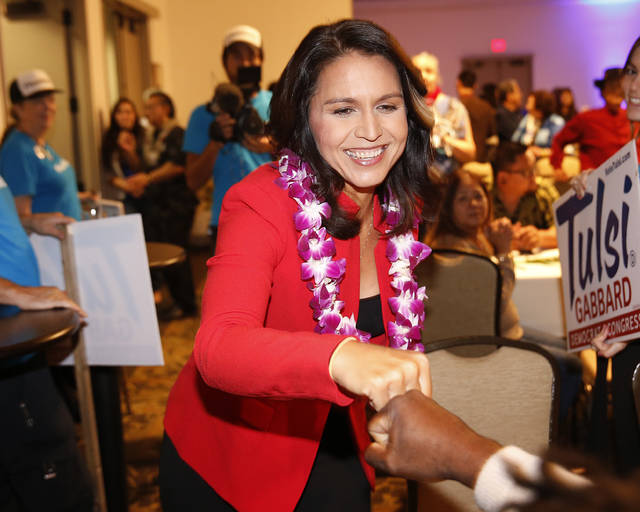Tulsi Gabbard’s birthplace could create political fodder in national campaign

ASSOCIATED PRESS
Congresswoman Tulsi Gabbard, pictured in Honolulu in November, said she is giving serious thought to making a run for president.
Congresswoman Tulsi Gabbard was born a U.S. citizen and served two tours of duty in the Middle East as a member of the Army National Guard. She’s served in elective office — as a member of the Hawaii Legislature, Honolulu City Council and U.S. House of Representatives — for a combined 10 years.
So it might seem odd that her eligibility to run for president of the United States, something she’s giving serious thought to, would ever be called into question. But being born in American Samoa, where Gabbard lived until the age of 2, elicits unsettled constitutional questions about what it means to be a “natural-born citizen,” a requirement for the presidency, according to legal scholars.
And while a broad consensus holds that Gabbard is indeed eligible to run, that gray area within constitutional law could become a political issue for the Hawaii representative if she does seek the national political spotlight.
The issue surfaced for former Michigan Gov. George Romney, who was born in Mexico, when he ran for president in 1968. It became an issue Opens in a new tab for late Arizona Sen. John McCain, who was born in the Panama Canal Zone where his father was stationed as a Navy officer.
Most recently, it was a point of contention Opens in a new tab for Texas Sen. Ted Cruz, who was born in Canada and engaged in a bitter fight with President Donald Trump during the 2016 Republican presidential primary. Trump repeatedly threatened to sue Cruz over the question of his eligibility, an issue that became moot once Trump won the nomination.
Trump took the issue further than most, by fanning the baseless conspiracy theory Opens in a new tab about Hawaii-born President Barack Obama being born in Kenya, helping coin the term “birther” in reference to those who question candidates’ eligibility based on their birthplace.
Don't miss out on what's happening!
Stay in touch with breaking news, as it happens, conveniently in your email inbox. It's FREE!
The Obama case aside, legal scholars say there are various legal complexities involved when someone born outside the 50 states runs for president.
“I think that people might raise it for political reasons, but it is also a puzzle that’s attractive for legal scholars because there is this defect in the Constitution,” said Gabriel Chin, a professor at the University of California at Davis School of Law and expert in constitutional law.
Chin noted that Congress could fix the problem by amending the Constitution to get rid of the natural-born citizen clause, or clarifying its meaning, but it hasn’t, and the courts have not opined on it.
“Lawyers like court decisions to say. ‘OK, it is definitely this or definitely not this,’ and we don’t have one and are not likely to get one,” said Chin. “So the controversy is probably going to continue to percolate.”
A question of soil
People born in American Samoa, a U.S. territory, are known as U.S. nationals. They pay U.S. taxes and have American passports but can’t vote or run for elected office outside of American Samoa unless they apply for and are granted U.S. citizenship.
The issue arose in Hawaii this year when a Republican candidate for the state House of Representatives, American Samoa-born Sailau Timoteo of Waianae, was disqualified from the race when the state Attorney General’s office realized she wasn’t a U.S. citizen.
Gabbard has never had that problem because she was a U.S. citizen from birth by virtue of her parents. Her mother, Carol Gabbard, was born in Indiana and grew up in Michigan. Her father, state Sen. Mike Gabbard, was born in American Samoa but a U.S. citizen by virtue of his father. Mike Gabbard’s father was also born in American Samoa, but was a U.S. citizen because his father (Mike Gabbard’s grandfather) was born in Kentucky, according to a spokeswoman for Tulsi Gabbard.
Gabbard needed only one of her parents to be a U.S. citizen to gain automatic citizenship. But the question, if she’s to run for president, is not whether she is a citizen, but whether she’s a “natural-born citizen,” the definition of which is a matter of legal debate.
“She is, no question, a citizen at the moment of her birth under U.S. law,” said Derek Muller, a professor at Pepperdine University Law School who specializes in election law. “The real question that arises is about whether or not you have to be born on U.S. soil, and not only that, on U.S. soil where citizenship sort of flows from merely being born on that soil.”
Most scholars hold the view that being born a U.S. citizen makes one a “natural-born citizen,” said Chin, who agrees with that interpretation. But he said critics of the broader view say that if someone needs a separate law to make them a citizen, such as that passed by Congress in 1917 conferring citizenship to Puerto Ricans, then they are not a “natural-born” citizen.
“Natural means without a special law for you,” he said, summarizing the minority view.
Chin said the argument is sometimes taken to the extreme in arguing African-Americans can’t be president because it was the 14th amendment that granted them citizenship.
“I think that stuff is absurd and inconsistent with the 14th Amendment,” he said. Still, it’s a debate that’s been written about regularly by scholars, he said.
Leaving it up to voters
Muller sees Gabbard’s case as akin to McCain’s circumstances. While questions were raised about the Republican’s eligibility to run for president, even prompting the Senate to pass a resolution saying he was eligible, it didn’t seem to have much, if any, effect on his political campaign.
And even if a serious legal case were brought against a candidate by someone with standing on the issue, both Muller and Chin say it’s unlikely the courts would want to weigh in.
“Courts are going to be very, very reluctant to get involved in something like this,” said Chin. “They are not going to want to interfere with the will of the people. And I think they’re going to think that it is really not up to them to decide.”
But so long as there is constitutional ambiguity about what it means to be a natural-born citizen, candidates will likely have to continue grappling with it in today’s overheated political arena.
“I think this remains a fairly open issue and we have seen this in the last several presidential cycles and it seems never to go away,” said Muller.

 Stay updated on Hawaii and national elections coverage
Stay updated on Hawaii and national elections coverage


